This post may contain affiliate links. Learn more.
These Old Bay crab cakes are my favorite version of a classic Baltimore, Maryland-style recipe. Lots of succulent crab meat and seasonings and very little else.
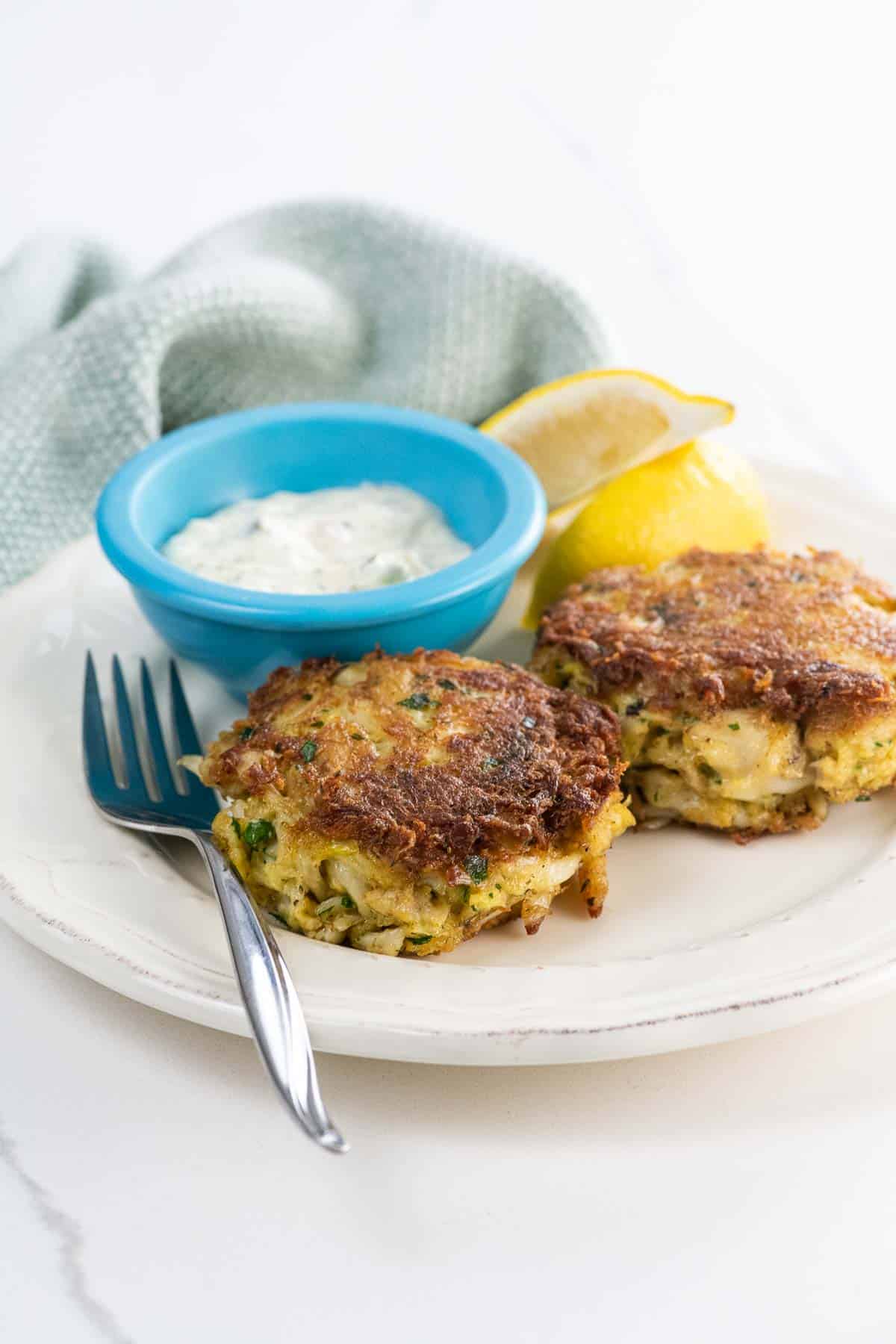
Why we love this recipe
Maryland crab cakes are an absolute American classic. This is my favorite version. This recipe puts the spotlight on the beautiful crab meat, with just the right amount of seasoning and just enough binding to keep the cakes together.
You can:
- Serve them as the main attraction with plenty of freshly squeezed lemon and tartar sauce
- Make them petite and serve as an hors d’oeuvre
- Tuck one into a perfect simple sandwich
- Make crab cake Benedict
- And so much more
What you’ll need
Here’s a glance at the ingredients you’ll need to make this recipe.
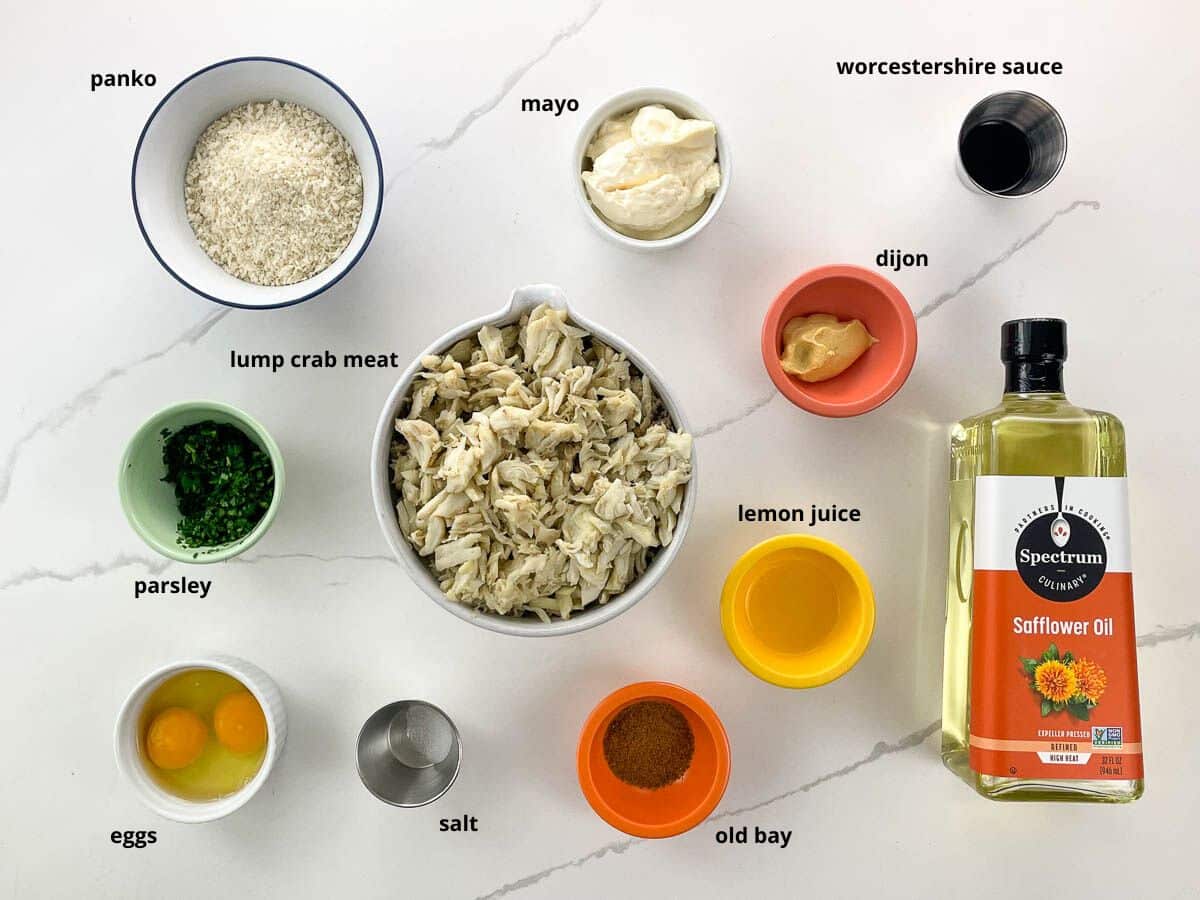
- Lump crab meat is the perfect choice for crab cakes. It consists of beautiful white pieces of body meat and broken pieces of jumbo lump (from the muscles that connect the swimmer fins). The pieces are mild-flavored and large enough to be succulent but not so large that your crab cakes won’t stay together. If you can find it fresh-picked over ice at the fish market, you’ll get the very best of both flavor and nutrients, but good-quality pasteurized crab meat in a tub is absolutely fine too. Avoid canned crab meat.
- Panko (Japanese-style bread crumbs) provides just a little bit of binding and bulk to help the cakes come together. Alternatively, you can use an equal measure of crushed saltine crackers.
- I’ve included just enough eggs to bring the crab cakes together, and I really like this ratio of ingredients, which keeps the focus on the crab.
- Old Bay seasoning is a nonnegotiable classic for Maryland-style crab cakes. It includes celery salt, paprika, red and black pepper, and a blend of many other herbs and spices that its producer doesn’t disclose.
- Flat-leaf (Italian) parsley adds flecks of brightness and a mild, fresh flavor. If you like, you can replace up to half of the parsley other soft fresh herbs, such as tarragon, dill, chives, or chervil.
- Safflower oil is my high-smoke-point, neutral-tasting vegetable oil of choice. You can substitute another oil that has similar properties, such as canola, sunflower, peanut, corn, or vegetable oil blend.
How to make it
Here’s an overview of what you’ll do to make a fabulous batch of Old Bay crab cakes. You can see the steps in action in the video that accompanies this post, and get all the details in the recipe card below.
For the crab cakes
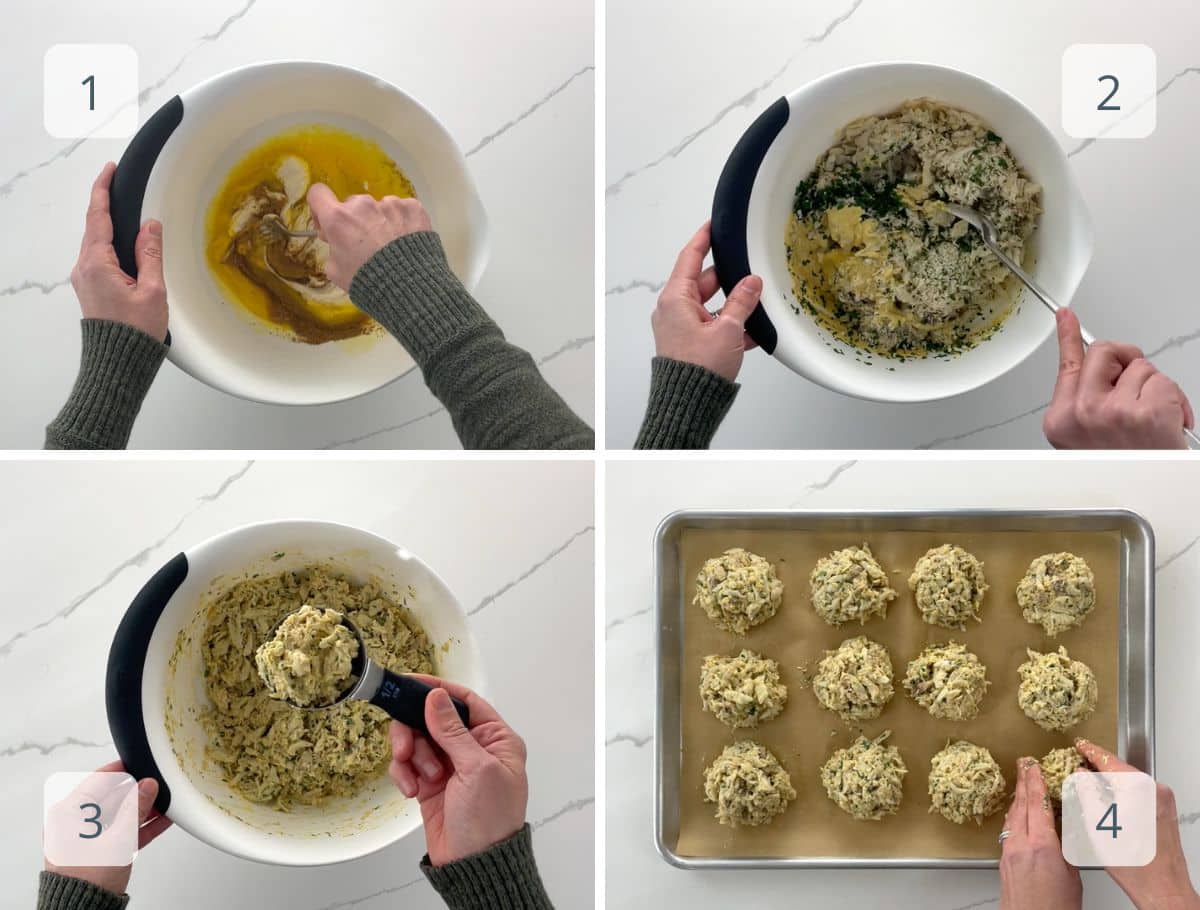
- In a large bowl, beat the eggs. Then mix in the mayo, mustard, Worcestershire, lemon juice, Old Bay, and salt.
- Add the crab meat, panko, and parsley. Using a large mixing spoon or a silicone spatula, carefully fold the ingredients together to distribute well without breaking up the meat.
- Use a 1/2-cup measure to portion the cakes.
- With your hands, shape each portion into a mound and place on a parchment-lined sheet pan. Cover tightly and chill for at least an hour, up to 24 hours.
To cook
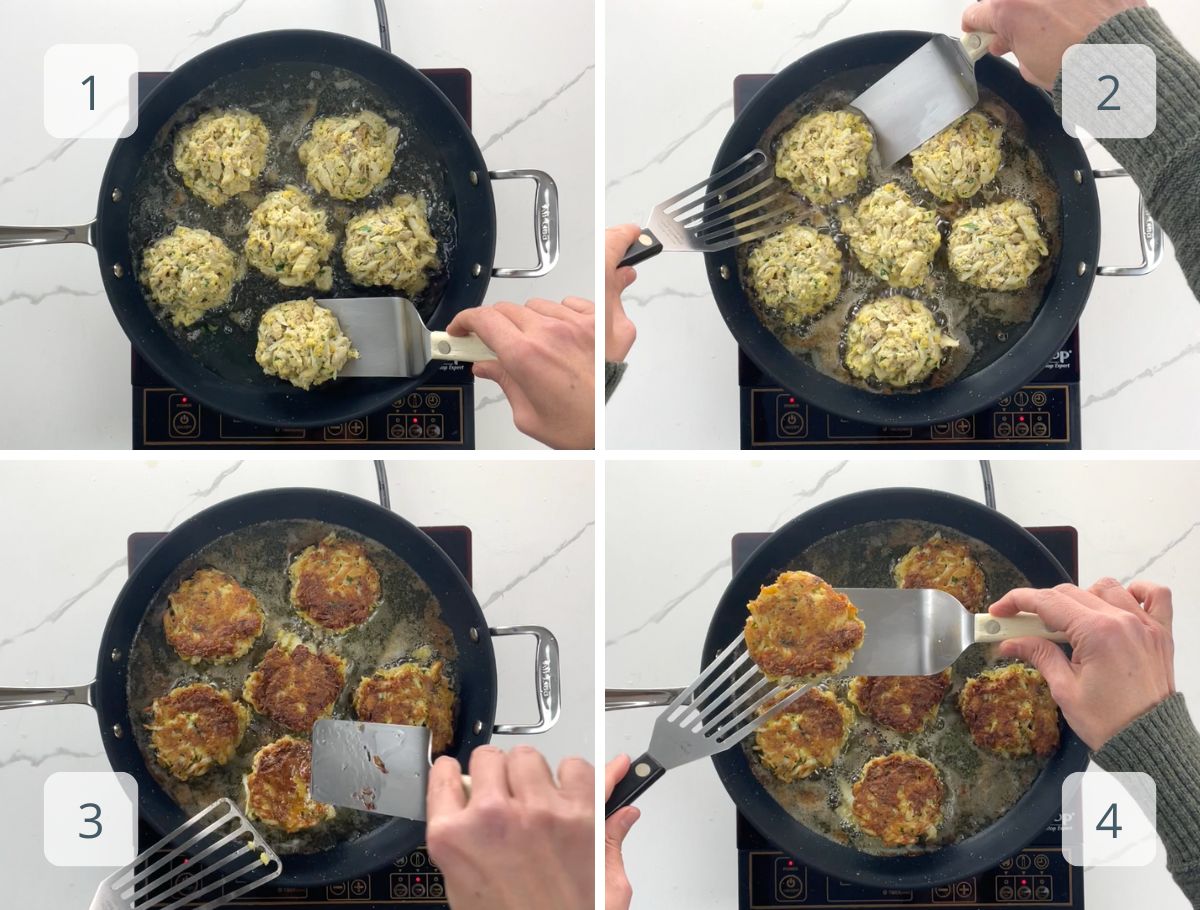
- Heat about 1/4 inch of safflower oil in a 12-inch nonstick skillet until it reaches between 350° and 375°F. This temperature range will allow the cakes to cook through and brown nicely at an equal rate, and the cakes won’t soak up more oil than necessary.
- Add half of the chilled crab cakes and cook undisturbed until a nice golden brown crust forms on the underside, usually four to five minutes. The crust is delicious and also holds the cakes together when you flip them.
- Flip and continue cooking for four to five minutes more, until browned on the second side and cooked through. As you can see from the photos and video, I like to use two spatulas to ensure a perfect flip.
- Drain on paper towels and repeat with remaining crab cakes. You can keep the first batch warm in a 200°F oven if you like. That’s it!
Expert tips and FAQs
Instead of portioning the cakes into 1/2-cup mounds, use a slightly rounded 1 1/2-tablespoon (medium) cookie scoop to form 48 small crab cakes. The rest of the process is the same. Cooking time will be shorter, but you’ll look for the same visual cues.
Yes! You can freeze them before or after cooking, for up to three months. For best results, I prefer to freeze before cooking and defrost in the refrigerator overnight. Simply place the baking sheet in the freezer instead of the refrigerator, freeze until solid, and then transfer to an airtight container.
You can form the cakes up to 24 hours in advance and keep the tightly covered baking sheet in the fridge.
Leftover crab cakes will keep in an airtight container in the fridge for up to a week. Reheat in the oven or toaster oven or at medium power in the microwave.
More favorite shellfish recipes
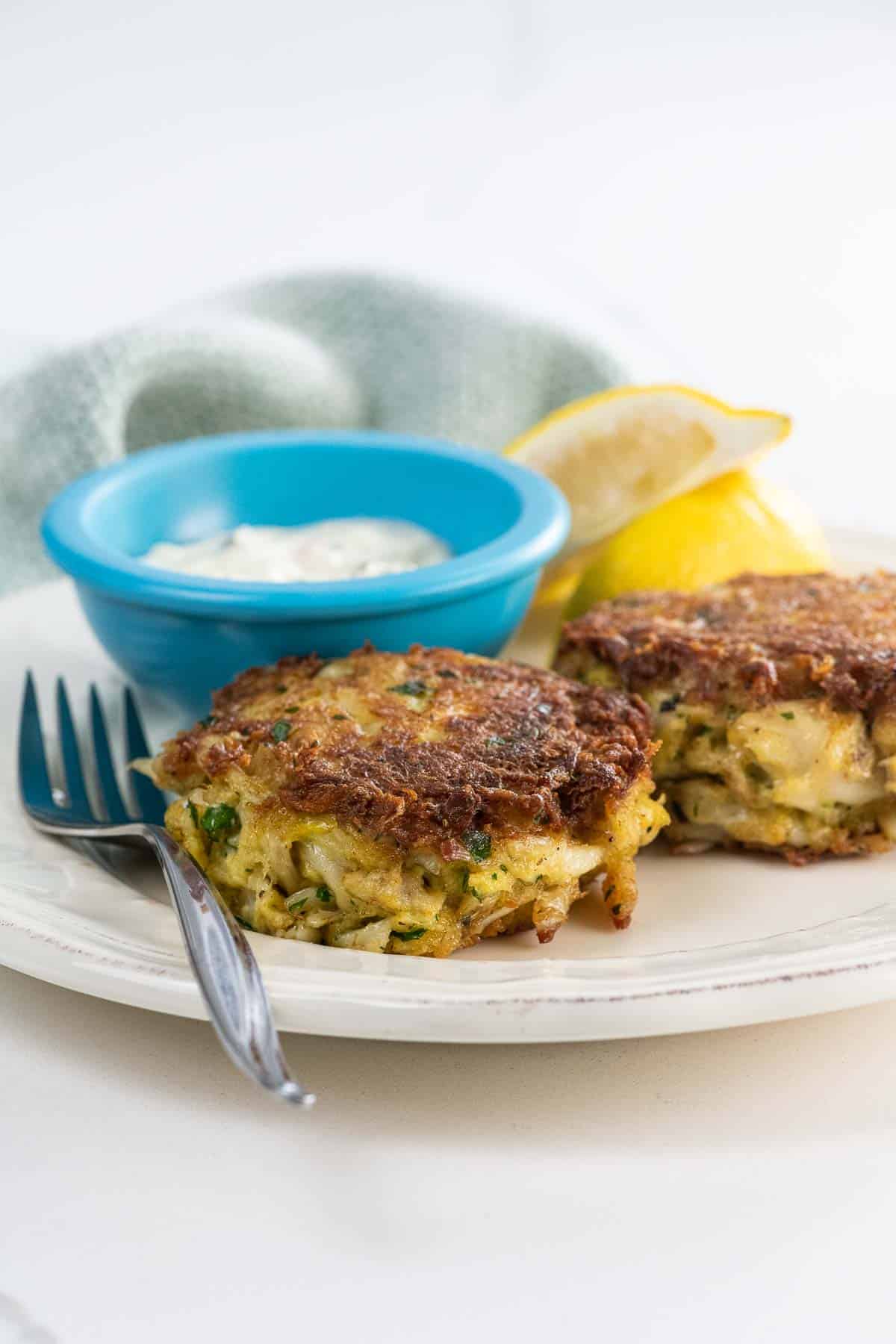
Hungry for more?
Subscribe to Umami Girl’s email updates, and follow along on Instagram.
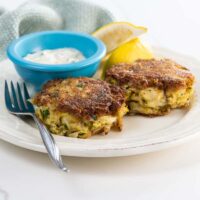
Old Bay Crab Cakes
Ingredients
- 2 pounds (907 grams) lump crab meat
- 2 eggs
- ½ cup (120 grams) mayonnaise
- 1 tablespoon (15 grams) dijon mustard
- 1 tablespoon (15 ml) Worcestershire sauce
- 1 tablespoon (15 ml) freshly squeezed lemon juice
- 2 teaspoons Old Bay seasoning
- ¼ teaspoon fine sea salt
- 1 cup (45 grams) panko bread crumbs
- ¼ cup about (10 grams) minced fresh parsley
- Safflower oil, for pan frying
Instructions
- Gently pick over the crab meat and remove any bits of shell.
- Crack the eggs into a large mixing bowl and beat with a fork.
- Add the mayonnaise, mustard, Worcestershire sauce, lemon juice, Old Bay, and salt. Stir to combine thoroughly.
- Add the crab meat, panko, and parsley to the bowl.
- With a large spoon or a silicone spatula, gently fold the ingredients together to combine well without breaking up the crab meat.
- Line a baking sheet with parchment — you'll use it to chill the crab cakes after forming and before cooking.
- Divide mixture into 12 equal parts using a dry 1/2-cup measure.
- Gently form each portion into a relatively tidy mound and place onto the lined baking sheet.
- Cover tightly and refrigerate for at least an hour, up to 24 hours.
- When ready to cook, pour safflower oil into a 12-inch nonstick frying pan to a depth of about 1/4 inch. Warm over medium-high heat to between 350° and 375°F.
- Add half the crab cakes, being careful for splatters. Cook undisturbed until golden brown on the undersides, likely four to five minutes. It is very important that the crab cakes have formed a nice, cohesive crust on the undersides before you flip them, or else you'll have trouble getting them to hold together.
- Just before flipping, give each cake a gentle pat with the spatula to compress the ingredients just slightly. This will minimize any loose pieces escaping the cakes as you flip.
- Carefully flip each cake. I sometimes like to do this with two spatulas, as you'll see in the video. Continue cooking until golden brown on the second side and cooked through, another four minutes or so.
- Remove from pan and let rest on paper towels or a wire rack. (If you like, you can keep them warm in the center of a 200°F oven.)
- Repeat with remaining crab cakes, adding more oil to the pan if necessary, and serve.
Notes
- Lump crab meat is the perfect choice for crab cakes. It consists of beautiful white pieces of body meat and broken pieces of jumbo lump (from the muscles that connect the swimmer fins). The pieces are mild-flavored and large enough to be succulent but not so large that your crab cakes won't stay together. If you can find it fresh-picked over ice at the fish market, you'll get the very best of both flavor and nutrients, but good-quality pasteurized crab meat in a tub is absolutely fine too. Avoid canned crab meat.
- Panko (Japanese-style bread crumbs) provides just a little bit of binding and bulk to help the cakes come together. Alternatively, you can use an equal measure of crushed saltine crackers.
- Old Bay seasoning is a nonnegotiable classic for Maryland-style crab cakes. It includes celery salt, paprika, red and black pepper, and a blend of many other herbs and spices that its producer doesn't disclose.
- Safflower oil is my high-smoke-point, neutral-tasting vegetable oil of choice. You can substitute another oil that has similar properties, such as canola, sunflower, peanut, corn, or vegetable oil blend.
- To make hors d’oeuvre sized (mini) crab cakes: Instead of portioning the cakes into 1/2-cup mounds, use a slightly rounded 1 1/2-tablespoon (medium) cookie scoop to form 48 small crab cakes. The rest of the process is the same. Cooking time will be shorter, but you'll look for the same visual cues.
- You can freeze crab cakes before or after cooking, for up to three months. For best results, I prefer to freeze before cooking and defrost in the refrigerator overnight. Simply place the baking sheet in the freezer instead of the refrigerator, freeze until solid, and then transfer to an airtight container.
- Prep ahead: You can form the cakes up to 24 hours in advance and keep the tightly covered baking sheet in the fridge.
- Leftover crab cakes will keep in an airtight container in the fridge for up to a week. Reheat in the oven or toaster oven or at medium power in the microwave.
Nutrition
Nutrition information is automatically calculated, so should only be used as an approximation.
Hungry for more?
Subscribe to Umami Girl’s email updates, and follow along on Instagram.

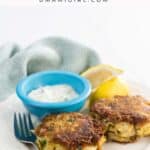
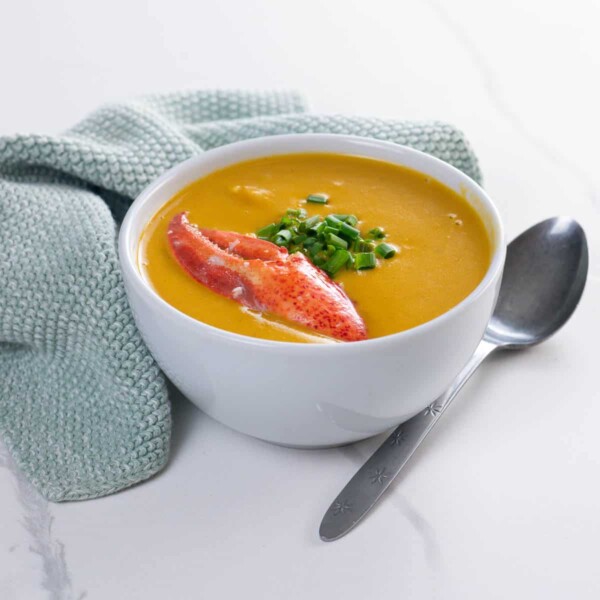
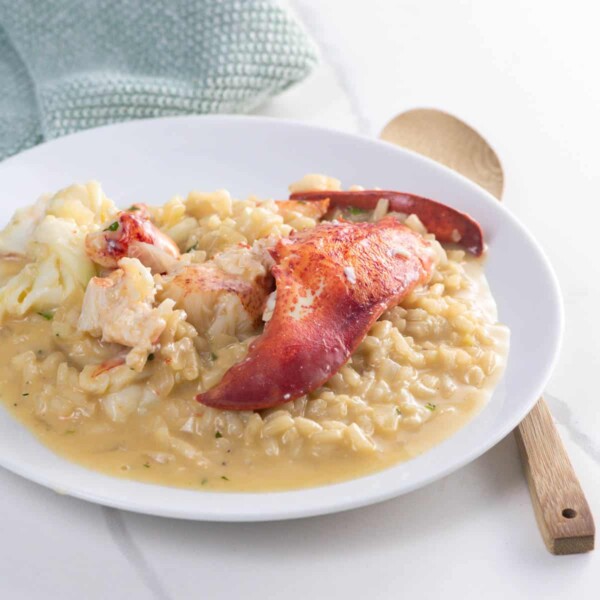
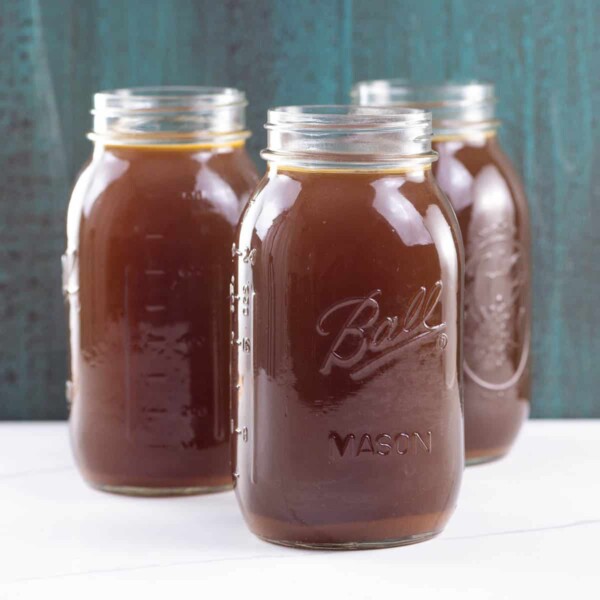
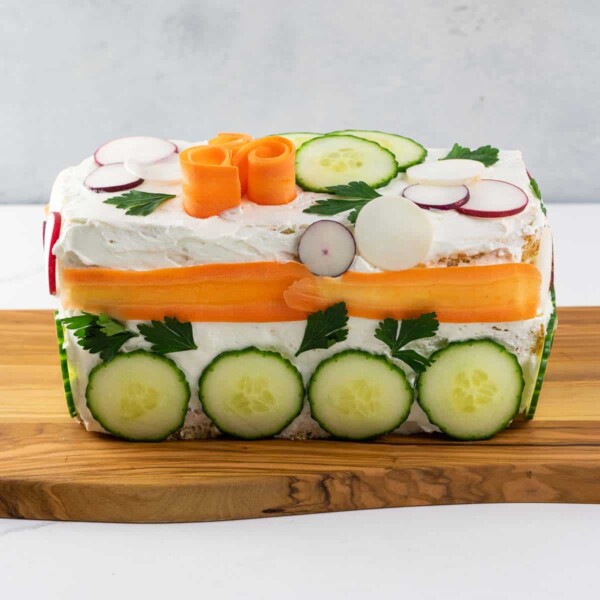







OMG!!! OMG!!! Love Old Bay so much!! Great recipe! After cooking I sprinkled some more old bay over the crab cakes prior to serving. I added an extra egg to the recipe and seemed to help keep the crab cakes formed. I’m planning to make Maryland Crab Cake sliders for Super Bowl Sunday. Using some horseradish with mayo as a dressing on the warm slider bread!!